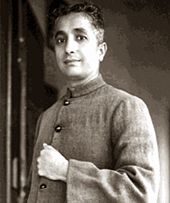The Pampa Award (or Pampa Prashasti) is a literary award in the Indian state of Karnataka. The award was established in 1987 by the government of Karnataka. It is the highest literary honor conferred by the Department of Kannada and Culture, Government of Karnataka State, and recognises works written in the Kannada language (1 of the 22 official languages of India).[1]
| Pampa Prashasti ಪಂಪ ಪ್ರಶಸ್ತಿ | |
|---|---|
| Civilian award for contributions to Kannada literature | |
| Awarded for | Highest literary award of Karnataka |
| Sponsored by | Government of Karnataka |
| Reward(s) | ₹1 lakh (1987–2007) ₹3 lakh (2008–present)Present - 5 lakh |
| First awarded | 1987 |
| Last awarded | 2022 |
| Highlights | |
| Total awarded | 36 |
| First winner | Kuvempu |
| Last winner | Na D'Souza |
The award is named after the first Kannada poet Adikavi Pampa.[2] The award originally comprised a cash prize of ₹1 lakh (US$1,300), a shawl, a citation and a memento.[3] The cash prize was increased to ₹3 lakh (US$3,800) in 2008.[4] Prior to 1996, the awards were given for a best single work by a Kannada writer. Since then, the award has been given to writers for their lifetime contribution to the Kannada literature. The Pampa Prashasti is presented by the Chief Minister, during the Kadambotsava, a cultural festival held annually in Pampa's hometown of Banavasi in Uttara Kannada district.[2][5]
Since its inception in 1987, the award has been given to a more than 30 individuals.[6] Kuvempu was the first recipient of the award who was honored for his work Sri Ramayana Darshanam (1949), a modern rendition of the Indian epic Ramayana. In 2015, Chandrashekhar Patil returned his award as a sign of protest against the assassination of the scholar M. M. Kalburgi.[7] The most recent recipient is [[]], who was awarded in 2019 for his lifetime contribution.
Recipients




| Year | Writer | Work | Ref. |
|---|---|---|---|
| 1987 | Kuvempu | Sri Ramayana Darshanam | [8] |
| 1988 | T. N. Srikantaiah | Bharathiya Kavya Meemaamse | [9] |
| 1989 | K. Shivaram Karanth | Mai Managala Sulliyali | [10] |
| 1990 | S. S. Bhoosnurmath | Shoonya Sampadaneya Paramarshe | [9] |
| 1991 | P. T. Narasimhachar | Shri Haricharitha | [11] |
| 1992 | A. N. Murthy Rao | Devaru | [11] |
| 1993 | Gopalakrishna Adiga | Suvarna Puthalli | [12] |
| 1994 | Sediyapu Krishna Bhatta | Vichara Prapancha | [13] |
| 1995 | K. S. Narasimhaswamy | Dundu Mallige | [9] |
| 1996 | M. M. Kalburgi | Lifetime contribution | [9] |
| 1997 | G. S. Shivarudrappa | Lifetime contribution | [9] |
| 1998 | Javare Gowda | Lifetime contribution | [14] |
| 1999 | Chennaveera Kanavi | Lifetime contribution | [15] |
| 2000 | L. Basavaraju | Lifetime contribution | [16] |
| 2001 | Poornachandra Tejaswi | Lifetime contribution | [17] |
| 2002 | M. Chidananda Murthy | Lifetime contribution | [18] |
| 2003 | Chandrashekhara Kambara | Lifetime contribution | [19] |
| 2004 | H. L. Nage Gowda | Lifetime contribution | [20] |
| 2005 | S. L. Bhyrappa | Lifetime contribution | [9] |
| 2006 | G. S. Amur | Lifetime contribution | [21] |
| 2007 | Yashwant V. Chittal | Lifetime contribution | [9] |
| 2008 | T. V. Venkatachala Sastry | Lifetime contribution | [22] |
| 2009 | Chandrashekhar Patil | Lifetime contribution | [23] |
| 2010 | Govindray H. Nayak | Lifetime contribution | [24] |
| 2011 | Baraguru Ramachandrappa | Lifetime contribution | [9] |
| 2012 | D. N. Shankara Bhat | Lifetime contribution | [25] |
| 2013 | Kayyar Kinhanna Rai | Lifetime contribution | [26] |
| 2014 | G. Venkatasubbiah | Kannada lexicography | [2] |
| 2015 | B. A. Sanadi | Lifetime contribution | [27] |
| 2016 | Hampanā | Lifetime contribution | [28] |
| 2017 | K. S. Nissar Ahmed | Lifetime contribution | [29] |
| 2018 | S. Shettar | Lifetime contribution | [30] |
| 2019 | Siddalingaiah | Lifetime contribution | [31] |
| 2020 | C P Krishnakumar | Lifetime contribution | |
| 2021 | S.R.Ramaswamy | Lifetime contribution | |
| 2022 | Babu Krishnamurthy | Lifetime contribution | |
| 2023 | Na D'Souza | Lifetime contribution | [32] |
References
Further reading
- Chari, C (1994). The Book Review, Volume 18. Perspective Publications.
- Viswanatha, Vanamala (2000). Routes: representations of the West in short fiction from South India in translation. Macmillan. ISBN 9780333934111.
- Indian Literature, Volume 45, Issues 1–3. Sahitya Akademi. 2001.
External links
- Pampa Award recipients (in Kannada). Karnataka Sahitya Academy